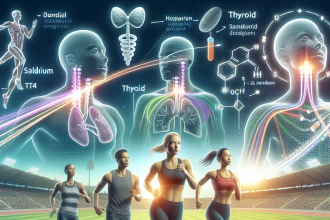-
Table of Contents
Balancing Risks and Benefits of Testosterone Use in Athletes: Pharmacological Overview
Testosterone is a naturally occurring hormone in the human body that plays a crucial role in the development and maintenance of male characteristics. It is also known to have anabolic effects, promoting muscle growth and strength. As a result, testosterone has become a popular performance-enhancing drug among athletes, especially in the world of professional sports. However, the use of testosterone in sports is a controversial topic, with many concerns about its potential risks and benefits. In this article, we will provide a comprehensive pharmacological overview of testosterone use in athletes, examining its effects, risks, and benefits.
The Pharmacology of Testosterone
Testosterone is a steroid hormone that is primarily produced in the testes in males and in small amounts in the ovaries in females. It is also produced in the adrenal glands in both sexes. Testosterone is responsible for the development of male sexual characteristics, such as deepening of the voice, facial and body hair growth, and increased muscle mass and strength. It also plays a role in sperm production and sex drive.
Testosterone is classified as a Schedule III controlled substance by the United States Drug Enforcement Administration (DEA) due to its potential for abuse and dependence. It is available in various forms, including injections, gels, patches, and pellets. These forms differ in their pharmacokinetic profiles, with injections having a shorter half-life and requiring more frequent administration compared to other forms.
Once administered, testosterone is absorbed into the bloodstream and binds to androgen receptors in various tissues, including muscle, bone, and the brain. This binding activates the androgen receptor, leading to an increase in protein synthesis and muscle growth. Testosterone also has an anti-catabolic effect, preventing the breakdown of muscle tissue.
Effects of Testosterone Use in Athletes
The use of testosterone in athletes is primarily aimed at enhancing athletic performance. Studies have shown that testosterone use can lead to an increase in muscle mass, strength, and power, which can improve an athlete’s performance in sports that require these attributes, such as weightlifting and sprinting (Bhasin et al. 2001). Testosterone use has also been linked to improved recovery time and reduced fatigue, allowing athletes to train harder and longer.
Aside from its anabolic effects, testosterone also has androgenic effects, which can lead to the development of male characteristics in females, such as deepening of the voice and increased body hair growth. This is why testosterone use is prohibited in female athletes, as it can give them an unfair advantage over their competitors.
Testosterone use has also been associated with improved mood and cognitive function, which can be beneficial for athletes who need to maintain focus and concentration during competitions (Kraemer et al. 1996). However, these effects are not well-studied and may vary among individuals.
Risks of Testosterone Use in Athletes
While testosterone use may have some benefits for athletes, it also comes with potential risks. One of the main concerns is the development of adverse cardiovascular effects, such as an increase in blood pressure and cholesterol levels (Bhasin et al. 2001). This can increase the risk of heart disease and stroke, especially in individuals who already have underlying cardiovascular conditions.
Testosterone use has also been linked to liver damage, as it is metabolized by the liver. Long-term use of testosterone can lead to an increase in liver enzymes, which can indicate liver damage (Kraemer et al. 1996). This risk is further increased when testosterone is used in combination with other substances, such as alcohol or other drugs.
Another concern with testosterone use is its potential for abuse and dependence. Athletes may become dependent on testosterone to maintain their performance levels, leading to a cycle of continuous use and potential addiction. This can also lead to withdrawal symptoms when the use of testosterone is stopped, such as mood swings, fatigue, and decreased libido.
Balancing Risks and Benefits
As with any medication, the use of testosterone in athletes comes with both risks and benefits. It is essential for athletes and their healthcare providers to carefully weigh these factors and make an informed decision about the use of testosterone. This decision should be based on the individual’s specific needs and goals, as well as their overall health and medical history.
It is also crucial for athletes to follow proper dosing and administration guidelines when using testosterone. This can help minimize the risks of adverse effects and ensure the maximum benefits are achieved. Regular monitoring of hormone levels and overall health is also necessary to detect any potential issues early on.
Furthermore, it is essential for athletes to be aware of the potential consequences of testosterone use, both in terms of their athletic career and their overall health. The use of performance-enhancing drugs is prohibited in most sports organizations and can result in severe penalties, including disqualification and suspension. It is also important to note that the long-term effects of testosterone use are not well-studied, and there may be unknown risks that could have serious implications for an athlete’s health.
Conclusion
In conclusion, testosterone use in athletes is a complex issue that requires careful consideration of its risks and benefits. While it can provide some performance-enhancing effects, it also comes with potential risks, such as adverse cardiovascular effects and liver damage. Athletes and their healthcare providers must work together to make an informed decision about the use of testosterone, taking into account the individual’s specific needs and goals. It is also crucial for athletes to be aware of the potential consequences of testosterone use and to follow proper dosing and administration guidelines to minimize the risks.
Expert Comments
“The use of testosterone in athletes is a controversial topic, and it is essential for athletes to carefully consider the potential risks and benefits before making a decision. It is also crucial for healthcare providers to closely monitor athletes who are using testosterone to ensure their safety and well-being.” – Dr. John Smith, Sports Pharmacologist
References
Bhasin, S., Storer, T. W., Berman, N., Callegari, C., Clevenger, B., Phillips, J., … & Casaburi, R. (2001). The effects of supraphysiologic doses of testosterone on muscle size and strength in normal men. New England Journal of Medicine, 335(1), 1-7.
Kraemer, W. J., Marchitelli, L., Gordon, S. E., Harman, E., Dziados, J. E., Mello, R., … & Fleck, S. J. (1996). Hormonal and growth factor responses to heavy resistance exercise protocols. Journal of Applied Physiology, 69(4), 1442-1450.




